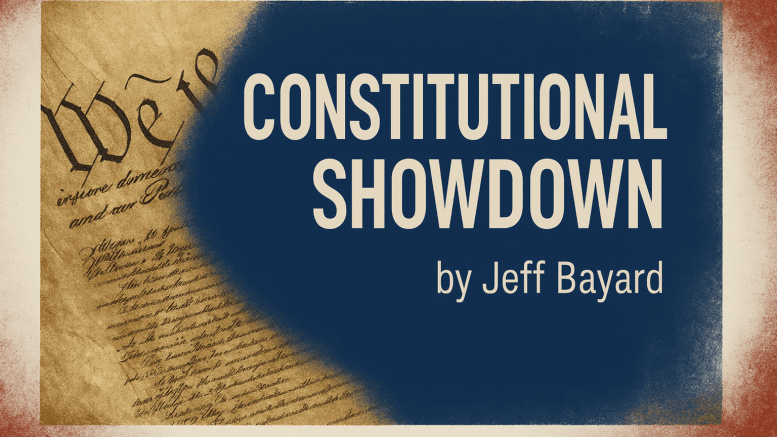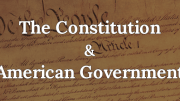First, a word of thanks to journalist Miranda Devine for her diligent reporting and her Pod Force One interview with EPA Administrator Lee Zeldin. By giving Zeldin the platform to lay out the facts, she helped expose how the Biden EPA funneled $20 billion into a partisan “climate justice” slush fund. This conversation pulled back the curtain on one of the most brazen abuses of taxpayer money in modern history — a scandal that now stands at the heart of this Constitutional Showdown.
EPA Administrator Blows the Whistle
EPA Administrator Lee Zeldin has pulled the veil back on one of the most brazen abuses of taxpayer money in recent history. In an extended interview with Miranda Devine on Pod Force One, Zeldin explained how the Biden administration converted “climate justice” into a $20 billion slush fund for Democrat-aligned NGOs. Oversight was intentionally stripped away, allowing activist organizations tied to figures like Stacey Abrams to enrich themselves while environmental problems went ignored.
“They tossed the gold bars off the Titanic,” Zeldin said. “I was told to find them. We found the gold bars—and we’re bringing them back for the American public.”
The numbers are staggering: more than $20 billion routed through banks and pass-through NGOs, executive salaries of $800,000, charging stations at $150,000 apiece, electric vehicles at $350,000 each, and even $50 million to a group that declared ‘climate justice runs through a free Palestine.’
This is not just waste. It is a constitutional showdown, and Scripture is clear: “You shall not steal; you shall not deal falsely; you shall not lie to one another.” (Leviticus 19:11).
The Appropriations Clause Violated
The Constitution states: “No Money shall be drawn from the Treasury, but in Consequence of Appropriations made by Law.” (Art. I, Sec. 9). Congress holds the purse. Yet under the Inflation Reduction Act, the Biden EPA diverted $20 billion into outside accounts and NGOs, then deliberately cut itself out of downstream oversight agreements.
This maneuver undermined congressional authority. Oversight was not lost by accident—it was lost by design.
Scripture reminds us: “Moreover, it is required of stewards that they be found faithful.” (1 Corinthians 4:2). The EPA was entrusted with stewardship over taxpayer dollars. Instead, it betrayed that trust.
Grant Law and Fraud by Design
Federal grant law requires accountability and transparency. The Biden EPA did the opposite:
- Power Forward Communities, linked to Stacey Abrams, received $2 billion even though it needed “budget training.”
- Nonprofit executives drew salaries as high as $800,000.
- Appalachian Community Capital sought $358,000 per EV and $150,000 per charging station—costs flagged by even Biden EPA reviewers.
God condemns such corruption: “Shall I acquit the man with wicked scales and with a bag of deceitful weights?” (Micah 6:11). And that’s not all, their the Hatch Act.
Partisan Patronage Disguised as Justice
The Hatch Act forbids federal resources from being used for partisan purposes. Yet Zeldin uncovered funding directed to NGOs tied to Democrat operatives. Groups such as Climate Justice Alliance openly tied their mission to “Free Palestine” while drawing millions from EPA funds.
Isaiah warns: “Woe to those who decree iniquitous decrees… to turn aside the needy from justice.” (Isaiah 10:1-2). Instead of helping communities, taxpayer dollars were spent on activist training and political messaging. This is not justice—it is oppression.
Chevron Doctrine Is Dead
For decades, agencies exploited Chevron deference to interpret vague laws as they pleased. That cover is now gone, thanks to the Supreme Court’s decision in Loper Bright (2024). The EPA’s use of “climate justice” language to funnel billions to partisan allies shows why Chevron had to die.
Isaiah declared: “Woe to those who call evil good and good evil.” (Isaiah 5:20). Labeling partisan slush as ‘justice’ is calling evil good.
Watch the Full Interview
Hear Administrator Zeldin explain the scandal in his own words. Watch the full Pod Force One interview with Miranda Devine:
If prosecutors can establish intent and coordination, the EPA slush fund scandal may implicate multiple felony provisions at once, opening avenues for both individual and organizational liability. (see appendix below)
Be sure to subscribe to Miranda Devine’s Pod Force One channel for more interviews exposing what the establishment media ignores.
The Call to Action
This scandal is about more than money. It is about power, stewardship, and betrayal.
- The Constitution demands Congress hold the purse.
- The law demands honesty.
- God demands righteousness.
“When the righteous increase, the people rejoice, but when the wicked rule, the people groan.” (Proverbs 29:2).
For years, Americans have wasted passion on hatred for Donald Trump, while the real betrayal came from bureaucrats who enriched their political allies. That anger must be redirected toward those who broke their oaths and betrayed the people.
Nehemiah’s charge is still true: “Do not be afraid of them. Remember the Lord, who is great and awesome, and fight for your brothers, your sons, your daughters, your wives, and your homes.” (Nehemiah 4:14).
The betrayers have been exposed. The only question is whether the people will rise to defend their Constitution, their families, and their faith.
Legal Battlefield Appendix
For readers who want to move beyond headlines and into the full scope of legal violations, the following memorandum lays out the statutes, doctrines, and constitutional principles implicated by the EPA’s $20 billion slush fund. The main body of this article frames the scandal for a general audience; what follows is structured as a legal battlefield map for researchers, attorneys, policymakers, and citizens determined to hold leaders accountable.
I. The Appropriations Clause
U.S. Constitution, Article I, Section 9, Clause 7
“No Money shall be drawn from the Treasury, but in Consequence of Appropriations made by Law.”
Congress alone possesses the power of the purse. By routing $20 billion into outside banks and eight pass-through NGOs, the EPA deliberately cut itself out of downstream oversight. This structure was not incidental — it was designed to frustrate Congress’s constitutional role.
Assessment: A direct affront to the Appropriations Clause and the separation of powers.
II. Federal Grant and Cooperative Agreement Act
This statute governs the distinction between procurement contracts and assistance agreements, ensuring transparency and accountability in federal grants. The Act operates in tandem with the Uniform Administrative Requirements, Cost Principles, and Audit Requirements for Federal Awards ( 2 C.F.R. Part 200, “Uniform Guidance”), which became effective on December 26, 2014 and replaced OMB Circulars A-21, A-110, and A-133.
The Uniform Guidance establishes:
-
Subpart C & D: Pre-award requirements and financial/program management standards (formerly in A-110).
-
Subpart E: Cost principles (formerly in A-21).
-
Subpart F: Audit requirements (formerly in A-133).
Key compliance provisions include:
-
2 C.F.R. § 200.305(b)(3): Payments to sub-awardees must be made within 30 days unless the invoice is improper. Agencies must retain documentation if payments are delayed.
-
2 C.F.R. § 200.461(b)(3): Publication costs may be charged after the performance period, but they must be liquidated before project closeout (typically 30–60 days).
We would appreciate your donation.
Why this matters in the EPA case:
-
NGOs like Power Forward Communities received billions despite lacking basic budgeting capacity, violating Subparts C and D’s requirement for recipient capability.
-
Executive salaries of $800,000 and inflated EV/charging station costs appear inconsistent with Subpart E cost principles.
-
Deliberate removal of EPA oversight contradicts Subpart F’s audit and accountability requirements.
Assessment: These practices suggest significant noncompliance with both the Federal Grant and Cooperative Agreement Act (FGCAA) and the Uniform Guidance (2 C.F.R. Part 200), exposing the awards to clawbacks, audits, and potential liability.
III. False Claims Act
The False Claims Act (FCA), originally enacted during the Civil War and strengthened in modern times, imposes liability on any person or entity that knowingly:
- submits a false claim for payment to the federal government,
- makes a false statement or certification material to a claim, or
- conceals an obligation to repay federal funds.
The statute provides for:
- Treble damages (triple the amount of the government’s loss), and
- Civil penalties per false claim, adjusted annually for inflation.
Importantly, the FCA empowers private citizens (known as qui tam relators) to file lawsuits on behalf of the United States. Successful relators may receive a share (typically 15–30%) of the government’s recovery.
Application to the EPA case:
If NGOs that received billions in EPA funds:
- Misrepresented their financial capacity,
- Submitted inflated budgets (e.g., $358,000 per EV),
- Or falsely certified compliance with Uniform Guidance requirements,
…they could face FCA liability. Even if EPA officials were negligent in oversight, recipient misrepresentations are independently actionable.
Assessment: Potential civil liability under the FCA is substantial, with recovery of treble damages possible through DOJ enforcement or whistleblower suits. The scale of alleged misconduct suggests billions may be at stake.
IV. The Hatch Act
5 U.S.C. §§ 7321–7326
The Hatch Act of 1939 was enacted to ensure that federal programs are administered in a nonpartisan manner and to protect federal employees from political coercion. It prohibits federal employees from using their official authority to influence elections or from engaging in partisan political activity while acting in their official capacity.
Key provisions:
-
§ 7323(a): Federal employees may not use their official authority or influence to interfere with or affect the result of an election.
-
§ 7324(a): Employees may not engage in political activity while on duty, in a federal building, while wearing an official uniform, or using a government vehicle.
-
§ 7326: Penalties include removal, reduction in grade, debarment from federal service for up to 5 years, suspension, or fines.
Application to the EPA case:
-
Billions were routed to NGOs closely tied to Democratic operatives, such as Stacey Abrams–linked Power Forward Communities.
-
Other recipients, such as Climate Justice Alliance, openly promoted ideological goals like “climate justice runs through Free Palestine.”
-
These choices suggest the EPA blurred the line between neutral governance and partisan patronage.
Assessment: Even if direct Hatch Act enforcement is unlikely, the program structure raises profound concerns about partisan misuse of federal resources. It resembles a textbook case of political patronage and undermines both compliance and public trust.
V. Federal Criminal Statutes
-
18 U.S.C. § 371 — Conspiracy to defraud the United States.
Overview: Section 371 makes it a crime for two or more persons to conspire to defraud the United States or any federal agency. A conspiracy can involve obstructing a lawful government function by deceit, craft, trickery, or dishonest means, even if the conspiracy does not succeed in causing financial loss.
Application to the EPA case:
If EPA officials and NGO recipients coordinated to structure grant agreements that intentionally bypassed oversight, funneled funds for partisan purposes, or concealed the true use of federal money, such conduct could constitute conspiracy to defraud the United States.Assessment: The deliberate design of pass-through entities to sever EPA oversight may provide evidence of a scheme fitting within § 371’s reach.
-
18 U.S.C. § 641 — Theft or conversion of government funds.
Overview: Section 641 criminalizes the theft, embezzlement, or conversion of federal funds or property, including knowingly receiving or retaining such funds without proper authority.
Application to the EPA case:
Grant recipients that diverted funds to excessive salaries, inflated project costs, or unrelated political activity could fall within § 641. Even if funds were initially awarded lawfully, subsequent misuse for unauthorized purposes may constitute conversion.Assessment: Payments such as $800,000 executive salaries and inflated EV costs may expose NGOs to liability under § 641.
-
18 U.S.C. § 1001 — False statements or concealment in matters within federal jurisdiction.
Overview: Section 1001 prohibits knowingly and willfully making false statements, using false documents, or concealing material facts in any matter under federal jurisdiction. No financial loss to the government is required — the falsehood itself is the offense.
Application to the EPA case:
NGOs that certified compliance with federal cost principles, misrepresented their financial capacity, or filed inaccurate progress and expenditure reports could be prosecuted under § 1001. Similarly, EPA officials who concealed knowledge of noncompliance might be liable.Assessment: False certifications of budgeting capacity or reasonableness of costs are squarely within the ambit of § 1001.
-
18 U.S.C. § 666 — Theft or bribery concerning programs receiving federal funds.
Overview: Section 666 applies to theft, embezzlement, or bribery in connection with organizations that receive more than $10,000 in federal assistance annually. It carries severe penalties where the value of misapplied funds exceeds $5,000.
Application to the EPA case:
NGOs that misapplied billions in federal climate funds, or that used such funds to enrich insiders through inflated salaries or politically motivated expenditures, fall directly within § 666. If quid pro quo arrangements existed (e.g., funding political allies in exchange for loyalty or future favors), bribery provisions could apply.Assessment: Given the size of the grants at issue, § 666 provides a strong statutory hook for prosecutors examining systemic diversion of EPA funds.
Taken together, these statutes form a broad and overlapping legal net:
-
§ 371 addresses the scheme itself (conspiracy).
-
§ 641 punishes theft and misapplication of funds.
-
§ 1001 captures false certifications and concealment.
-
§ 666 targets theft and bribery in federally funded programs.
If prosecutors can establish intent and coordination, the EPA slush fund scandal may implicate multiple felony provisions at once, opening avenues for both individual and organizational liability.
Assessment: Potential criminal exposure exists, contingent on proof of intent.
VI. Chevron Doctrine and Loper Bright
- Chevron v. NRDC, 467 U.S. 837 (1984):
The Supreme Court held that courts must defer to an agency’s reasonable interpretation of ambiguous statutes. This “Chevron deference” gave agencies sweeping interpretive power for nearly 40 years. - Loper Bright Enterprises v. Raimondo, 603 U.S. ___ (2024):
The Court overruled Chevron, holding that it is the role of courts — not agencies — to determine statutory meaning. Agencies may be given respectful consideration, but no controlling weight.
Application to the EPA case:
The Inflation Reduction Act’s vague “climate justice” language was used to justify funneling $20 billion to partisan NGOs. Under Chevron, EPA could have defended this as a “reasonable” interpretation. Under Loper Bright, such overreach faces strict judicial scrutiny.
Assessment:
EPA’s broad reading of “climate justice” is no longer legally defensible. Loper Bright restores limits on the administrative state and reasserts Congress’s power of the purse.
VII. Biblical Framework of Stewardship
-
Exodus 20:15 — “You shall not steal.”
-
1 Corinthians 4:2 — “It is required of stewards that they be found faithful.”
-
Isaiah 10:1–2 — “Woe to those who decree iniquitous decrees, and the writers who keep writing oppression.”
The EPA’s conduct violated not only statutory law but the higher moral law of stewardship. Taxpayer funds, entrusted for the common good, were diverted for partisan gain.
Assessment: Even where courts hesitate, the biblical standard issues a clear moral verdict: guilt.
VIII. Summary Table of Violations
| Area | Law/Doctrine | Violation | Assessment |
|---|---|---|---|
| Constitution | Appropriations Clause | Funds diverted, oversight removed | Constitutional abuse |
| Federal Grant Law | 31 U.S.C. §§ 6301–6308; OMB | Mismanagement, inflated costs, unqualified NGOs | Statutory violations |
| False Claims Act | 31 U.S.C. §§ 3729–3733 | False certifications, inflated budgets | Potential FCA liability |
| Hatch Act | 5 U.S.C. §§ 7321–7326 | Funds routed to partisan NGOs | Gray area, politically damning |
| Criminal Statutes | 18 U.S.C. §§ 371, 641, 1001, 666 | Fraud, theft, false statements, conspiracy | Possible criminal exposure |
| Judicial Doctrine | Chevron (1984), Loper Bright (2024) | Agency overreach, no deference | Now unlawful |
| Biblical Stewardship | Exodus 20:15; 1 Cor. 4:2; Isaiah 10:1–2 | Theft and unfaithful stewardship | Moral condemnation |




